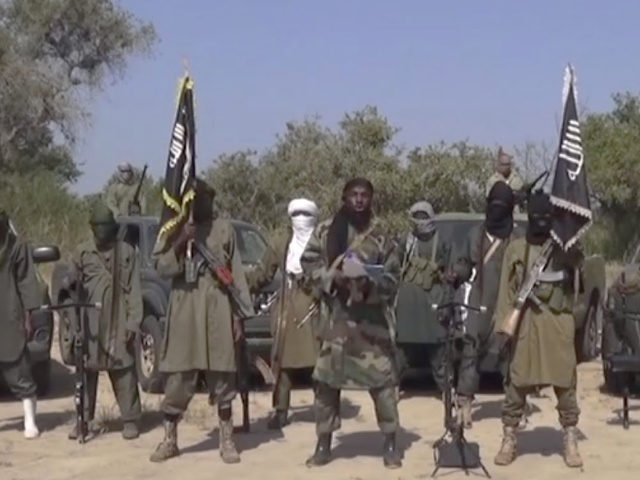A Nigerian general told Boko Haram jihadis over the weekend that surrendering and repenting would render them eligible to vie for the presidency or any other political position in Nigeria, Africa’s most populous country, largest economy, and biggest democracy.
The comments from Maj. Gen. Abdulmalik Bulama Biu, the commanding officer of a Nigerian Army division in Maiduguri, the capital of northeastern Borno state and the birthplace of Boko Haram, came while he was appealing to the Islamic State (ISIS/ISIL)-linked Boko Haram to surrender over the weekend, Pulse and other local outlets reported.
While briefing journalists in Maiduguri on Sunday, Biu declared:
Boko Haram should lay their arms unconditionally and be accepted in the community. Opportunities are out there for them, they can be rehabilitated.
An ex Boko Haram having laid his arms and turned away from his negativity, stands to be a president of this country. He stands to aspire to any position in this country.
Why is he wasting his time when he cannot even deliver? We’ve appealed to them, including their collaborators, to see reason to as fast as possible quickly drop their arms so that we can once again reoccupy our peaceful position.
Despite his appeal for peace, the general vowed to continue waging Nigeria’s war on terror and to bring lasting peace to the African nation.
“As a professional soldier, we’ll continue to do what we know best and that is to continue to project our effort in a more than determined way,” he declared.
In 2014, the Nigerian government officially launched its U.S.- and United Nations-backed re-integration and de-radicalization program at prisons to welcome repentant Boko Haram jihadis back into society.
Since 2015, the number of Boko Haram defectors in the prison-based rehabilitation programs has “increased exponentially to an estimated 800 members,” an article published by Third World Quarterly, a peer-reviewed academic journal, in April 2018 revealed.
In recent years, the programs have continued to proliferate beyond the prison-based initiative to other state-run facilities.
The latest U.S. Department of State assessment of terrorist activity across the world found that “468 persons were ordered to undergo a de-radicalization and rehabilitation program before being released” in 2017 alone.
In March 2018, President Muhammadu Buhari said his government is ready to accept the “unconditional laying down of arms by any member of the Boko Haram group who shows strong commitment in that regard,” according to the Premium Times.
“We are ready to rehabilitate and integrate such repentant members into the larger society. This country has suffered enough of hostility,” he added.
Breitbart News determined that are no exact figures on recidivism rates linked to the deradicalization programs.
The conflict between the Nigerian government and Boko Haram, which began in 2009, has killed 35,596 security forces, jihadis, and a significant number of civilians since 2011, according to a tally by the Council on Foreign Relations (CFR), last updated on July 1.
Clashes between state security forces and the terrorist group, which swore allegiance to the Islamic State (ISIS) in 2016, are responsible for the largest group of fatalities (18,312) since 2011, trailed by those perpetrated by Boko Haram alone at 16,525, CFR reported.
Under Buhari’s ongoing administration, inaugurated for its first term in May 2015, more than 23,000 people have died primarily at the hands of Boko Haram group (5,595).
Over 65 percent (23,220) of the total 35,596 deaths from the anti-Boko Haram war recorded by CRF have taken place since Buhari became president in 2015, Breitbart News found late last month.
Some communities have reportedly pushed back against the re-radicalization initiatives, fearing that former jihadis who claim to repent will continue to spread the terrorist groups’ violence and ideology. In sum, there is skepticism of those former Boko haram jihadis who claim to denounce violence.
Nevertheless, the Buhari administration has released hundreds of Boko Haram terrorists who repented and underwent the re-radicalization programs, including more than 1,200 last year alone.
In May, the Carnegie Endowment for International Peace reported, “There is a high risk that the return of former Boko Haram members could cause new tensions, and that some returnees could even return to violence if they struggle to find acceptance.”
Third World Quarterly adds:
The risk of recidivism is reduced by enforcing disengagement through monitoring by security forces and enforcing of social norms by communities resistant to the [terrorist group]. However excessive force, such as the killing of re-integrated former combatants and the high levels of suspicion by communities, risks being counter-productive in deterring participation in the [re-integration] program or by pushing former combatants to re-integrate into social spaces where the state has less control.
The Buhari administration has falsely claimed on several occasions to have defeated Boko Haram, but the terrorist group continues to wage a campaign of terror.
Buhari officials now claim to be facing a new threat from ISIS-WA, also known as ISWAP, although both groups still consist of many of the same terrorists.
In 2016, the ISIS faction allegedly broke away from Boko Haram over leadership issues.

COMMENTS
Please let us know if you're having issues with commenting.